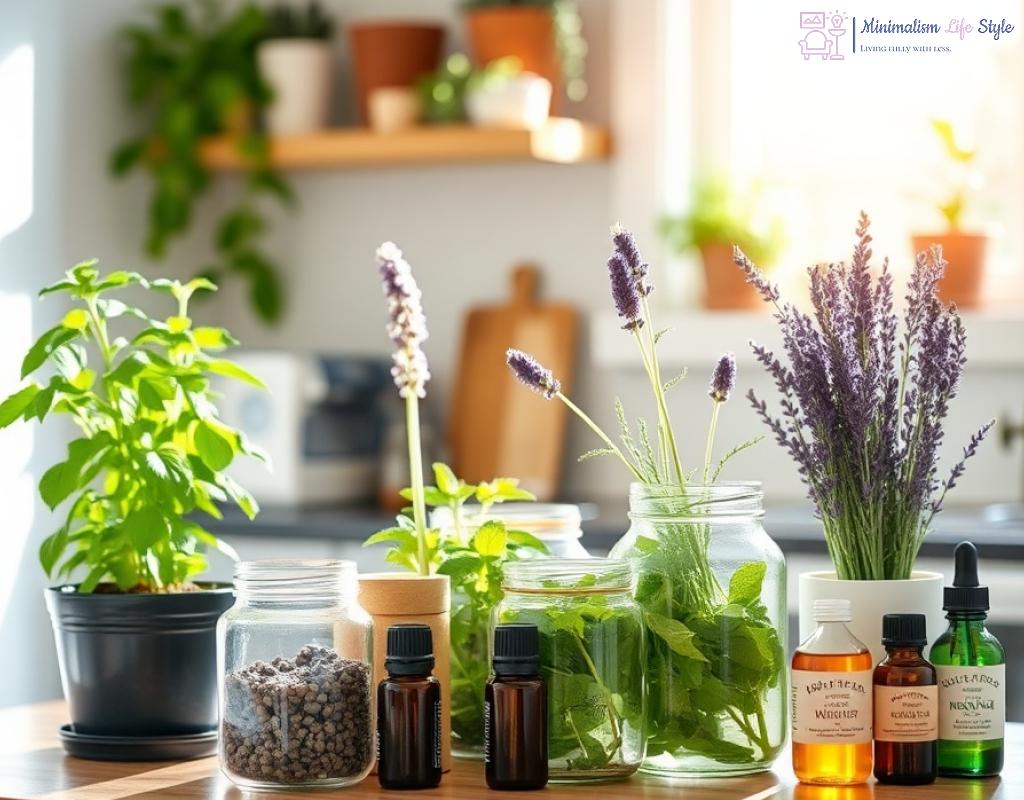Harnessing Nature: Effective Home Remedies for Pests
In a world inundated with chemical pest control methods, many homeowners are turning back to nature for effective solutions. Harnessing natural remedies not only helps in managing pest problems but also ensures a healthier living environment. With a plethora of options available, let’s explore how you can fend off unwelcome guests using simple, natural ingredients found right in your kitchen or garden.
Before you reach for that chemical-laden spray, consider these tried and tested natural remedies that have shown great efficacy in pest control. Here’s a comprehensive list of some of the most popular and effective home remedies:
- Vinegar Spray: A mixture of vinegar and water can deter ants and spiders. Spray around entry points for best results.
- Essential Oils: Oils like peppermint, tea tree, and lavender not only smell great but repel insects. Mix with water and spray.
- Salt and Water: This simple combination can kill slugs and snails when applied directly.
- Boric Acid: A natural insecticide, boric acid can be used to eliminate cockroaches and ants when sprinkled in their pathways.
- Garlic Spray: The pungent smell of garlic can ward off a variety of pests. Blend garlic cloves with water, strain, and spray.
Preventing pests is just as important as controlling them. By creating an environment that’s less attractive to pests, you can reduce the chances of an infestation. Implementing the following strategies can make your home less hospitable to unwanted visitors:
- Seal Cracks and Openings: Inspect your home for any gaps where pests might enter and seal them securely.
- Maintain Cleanliness: Regularly clean your kitchen and dining areas to eliminate food sources that attract pests.
- Use Natural Deterrents: Planting herbs like basil and mint can naturally deter certain insects.
Utilizing nature’s own arsenal against pests can lead to a healthier and more sustainable home environment. By adopting these remedies and preventative measures, you can achieve effective pest control without relying on harsh chemicals.
Essential Oils: Your Secret Weapon Against Unwanted Guests
When it comes to battling pests, essential oils emerge as a powerful ally, providing a fragrant and effective alternative to traditional pest control methods. These natural extracts, derived from plants, not only enhance your home’s ambiance but also serve as potent repellents against a variety of unwanted visitors. Let’s dive deeper into the world of essential oils and discover how you can harness their properties to keep your home pest-free.
Essential oils are more than just pleasant scents; they contain compounds that are toxic or repellent to many common pests. By utilizing these oils, you can create a natural barrier against insects while infusing your living space with delightful aromas. Below, we explore some of the most effective essential oils for pest control and their unique benefits:
- Peppermint Oil: Known for its invigorating scent, peppermint oil is particularly effective against ants, spiders, and mice. Its strong aroma disrupts their sensory perception, making your home less appealing.
- Lavender Oil: Not only does lavender smell heavenly, but it also repels moths, fleas, and mosquitoes. Its calming properties make it a favorite for use in bedrooms, ensuring a pest-free sleep.
- Tea Tree Oil: This oil boasts antiseptic properties and works wonders against a variety of insects, including cockroaches and lice. Its versatility makes it a staple in many natural pest control recipes.
- Citrus Oils (Lemon, Orange): The fresh scent of citrus oils is a deterrent for spiders and insects. Their natural acidity can also help clean surfaces while keeping pests at bay.
Creating your own pest control sprays with essential oils is not only simple but also allows you to customize the fragrance to your liking. Here’s a basic recipe to help you get started:
| Ingredients | Amount |
|---|---|
| Water | 1 cup |
| Essential Oil (choose one or combine) | 10-15 drops |
| Vinegar (optional) | 1/4 cup |
Mix these ingredients in a spray bottle, shake well, and spray around entry points, windows, and areas where you’ve noticed pest activity. This homemade solution is not only effective but also safe for your family and pets.
To maximize the effectiveness of essential oils in your pest control strategy, consider the following tips:
- Consistency is Key: Regularly apply your essential oil spray to maintain a protective barrier.
- Combine Forces: Use essential oils in conjunction with other natural remedies for a comprehensive pest control approach.
- Experiment with Blends: Don’t hesitate to mix different oils to find a fragrance you love while effectively deterring pests.
By embracing the power of essential oils, you can enjoy a home that is not only free of pests but also filled with delightful scents. This natural approach to pest control aligns perfectly with a holistic lifestyle and promotes a safe, chemical-free environment for your loved ones.
Preventive Measures: Keeping Pests at Bay Naturally
When it comes to pest control, the best offense is a good defense. By implementing preventive measures in your home, you can significantly reduce the chances of unwelcome visitors. A proactive approach not only protects your living space but also ensures a healthier environment for you and your family. This strategy focuses on maintaining cleanliness, utilizing natural barriers, and fostering an uninviting atmosphere for pests.
One of the most effective ways to keep pests at bay is by making your home less appealing to them. Regular cleaning is paramount; crumbs, spills, and clutter can attract various insects and rodents. Ensure your kitchen is spotless by promptly wiping down surfaces and storing food in airtight containers. Additionally, maintaining a tidy garden can deter pests from venturing indoors. By trimming overgrown plants and removing debris, you eliminate potential hiding spots for pests, making your home significantly less inviting.
Incorporating natural barriers into your pest control strategy can be remarkably effective. For instance, herbs and plants like basil, mint, and marigold not only enhance your garden’s beauty but also act as natural repellents. Planting these around your home creates a fragrant shield against common pests. Moreover, consider using diatomaceous earth around your garden and entry points. This natural powder is harmless to humans and pets but deadly to insects, as it damages their exoskeletons upon contact.
Finally, proper home maintenance is crucial for preventing pest infestations. Regularly inspect your home for any cracks or gaps that could serve as entry points for pests. Sealing these openings with caulk or weather stripping can significantly reduce the likelihood of an invasion. By investing in these preventive measures, you’re not only safeguarding your home but also contributing to a sustainable and chemical-free living environment.
DIY Traps: Simple Solutions for Common Household Pests
When it comes to pest control, DIY traps offer an effective and environmentally friendly way to manage unwanted guests in your home. Rather than relying on harsh chemicals, these simple traps utilize common household ingredients to create solutions that are both safe and efficient. By employing these traps, you not only protect your living space but also contribute to a more sustainable approach to pest management.
Understanding the behavior of pests is crucial in designing traps that will effectively capture them. For example, fruit flies are attracted to ripe or decaying fruits, making them easy targets for a homemade trap. Similarly, cockroaches are drawn to dark, moist areas, which can be exploited when creating effective baiting stations. By tapping into these natural inclinations, you can create traps that work harmoniously with the pests’ instincts rather than against them.
To ensure your DIY traps are successful, the bait you choose plays a pivotal role. For instance, a mixture of apple cider vinegar and dish soap can be an irresistible lure for fruit flies. The vinegar’s sweet smell draws them in, while the soap reduces surface tension, trapping them effectively. On the other hand, a simple peanut butter mixture can attract cockroaches, making it easy to catch them in a jar or on a sticky pad. Understanding these preferences allows you to tailor your traps to the specific pests you are dealing with.
Moreover, placement is key. Strategically positioning your traps in areas where you have noticed pest activity will yield the best results. For example, placing fruit fly traps near your kitchen sink or garbage can significantly increase the likelihood of capturing them. Meanwhile, cockroach traps should be hidden away in dark corners, where these creatures typically reside. By combining effective bait with thoughtful placement, you are setting the stage for successful pest control.
Once you’ve crafted your traps and begun to catch pests, it’s essential to incorporate these methods into a broader pest management strategy. Regularly check and refresh your traps, as stale bait can deter pests from returning. Furthermore, always accompany your trapping efforts with cleaning routines to eliminate any potential food sources and nesting areas. This dual approach not only reduces the pest population but also discourages future infestations.
In conclusion, by embracing the art of DIY traps, you empower yourself to take control of your home environment. These simple yet effective solutions not only provide immediate relief from common pests but also align with a natural, chemical-free lifestyle. As you experiment with different traps and baits, you’ll discover that a pest-free home is not just a dream—it’s a reality within your reach.
Creating a Pest-Friendly Environment: Gardening Tips
In the quest for a natural and effective pest control strategy, the journey begins right in your backyard. A well-planned garden not only beautifies your home but also serves as a formidable barrier against pests. By selecting plants that naturally repel insects and encouraging beneficial wildlife, you can cultivate an environment that minimizes pest infestations. This approach not only protects your plants but enhances the overall health of your garden ecosystem.
Choosing the Right Plants is paramount when it comes to creating a pest-friendly environment. Incorporating aromatic herbs such as basil, rosemary, and mint can be incredibly effective. These plants emit strong fragrances that deter pests while attracting pollinators, thus fostering a balanced ecosystem. Additionally, consider adding flowering plants like marigolds and nasturtiums, which are known to repel aphids and other common garden pests. The right combination of plants can create a natural defense system, significantly reducing the likelihood of pest issues.
While it may seem counterintuitive, welcoming certain insects into your garden can be a game-changer. These beneficial insects, including ladybugs, lacewings, and predatory wasps, play an essential role in controlling pest populations naturally. By providing habitats such as insect hotels or simply avoiding broad-spectrum pesticides, you enable these allies to thrive. Their presence can drastically reduce the need for chemical interventions, creating a more sustainable gardening practice.
Moreover, practicing companion planting is an excellent strategy to enhance your garden’s resilience against pests. For instance, planting garlic near roses can deter aphids, while the combination of tomatoes and basil not only promotes growth but also wards off harmful insects. Utilizing these natural partnerships allows you to maximize your garden’s potential while maintaining a pest-free environment.
Lastly, the foundation of a thriving garden lies in the health of its soil. Healthy soil produces robust plants that are more resistant to pests and diseases. Regularly incorporating organic matter such as compost can enhance soil fertility and structure, promoting deep root systems and overall plant vigor. This resilience is crucial, as strong plants are less likely to attract pests. Moreover, practicing crop rotation can help disrupt pest life cycles, further reducing infestations.
By implementing these gardening tips, you can create a pest-friendly environment that promotes biodiversity and minimizes the need for chemical pest control. Embracing these natural solutions not only protects your plants but also contributes to a healthier ecosystem, ensuring your garden thrives for years to come.




